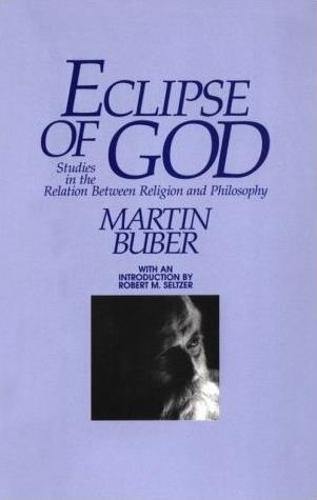Overview
"""The condition Buber calls the 'eclipse of God' is the reality that modern life and the teachings of many scholars have in many ways destroyed the opportunity for intimacy with an eternal, ever-present, Thou, or God. Based in part on a series of lectures he gave in the United States in 1951, this book examines Buber's interpretations of Western thinking and belief around this notion of lost intimacy or direct contact with the Divine, focusing particularly on the relationships between religion and philosophy, ethics, and Jungian psychology."" -Reference and Research Book News"
Full Product Details
Author: Martin Buber
Publisher: Prometheus Books UK
Imprint: Prometheus Books UK
Dimensions:
Width: 15.20cm
, Height: 1.00cm
, Length: 22.90cm
Weight: 0.200kg
ISBN: 9781573924016
ISBN 10: 1573924016
Pages: 170
Publication Date: 01 July 1988
Audience:
General/trade
,
General
Format: Paperback
Publisher's Status: Active
Availability: In Print

This item will be ordered in for you from one of our suppliers. Upon receipt, we will promptly dispatch it out to you. For in store availability, please contact us.
Reviews
The condition Buber calls the 'eclipse of God' is the reality that modern life and the teachings of many scholars have in many ways destroyed the opportunity for intimacy with an eternal, ever-present, Thou, or God. Based in part on a series of lectures
"""""The condition Buber calls the 'eclipse of God' is the reality that modern life and the teachings of many scholars have in many ways destroyed the opportunity for intimacy with an eternal, ever-present, Thou, or God. Based in part on a series of lectures he gave in the United States in 1951, this book examines Buber's interpretations of Western thinking and belief around this notion of lost intimacy or direct contact with the Divine, focusing particularly on the relationships between religion and philosophy, ethics, and Jungian psychology."" --Reference and Research Book News"
The condition Buber calls the 'eclipse of God' is the reality that modern life and the teachings of many scholars have in many ways destroyed the opportunity for intimacy with an eternal, ever-present, Thou, or God. Based in part on a series of lectures he gave in the United States in 1951, this book examines Buber's interpretations of Western thinking and belief around this notion of lost intimacy or direct contact with the Divine, focusing particularly on the relationships between religion and philosophy, ethics, and Jungian psychology. -- Reference and Research Book News
Author Information
"Martin Buber (1878 - 1965) was born in Vienna, Austria, but spent much of his childhood with his grandparents in Lvov (now Lviv, Ukraine). His grandfather was a renowned scholar of Jewish literature, who edited the first critical edition of the Midrashim, traditional biblical commentaries. When Buber came of age, he studied in Vienna, Leipzig, Berlin, and Zurich. From 1924 to 1933, he lectured on Jewish religious philosophy at the University of Frankfurt. During that time, he worked together with Franz Rosenzweig on a new German translation of the Hebrew Bible. When Hitler came to power, Buber was eventually forced to leave Germany in 1938. Though he traveled widely, he spent most of the rest of his life in Israel as a lecturer at the Hebrew University in Jerusalem. He had a great interest in and wrote many works on Hasidism, but he is best known for his 1923 book, Ich und Du (I and Thou). This influential work contrasts the personal and subjective ""I-Thou"" relationship, which participates in the dynamic, living process of an ""other,"" with an impersonal and objective ""I-It"" relationship, which experiences a detached thing, fixed in space and time. Buber expressed an early interest in Zionism, but more for religious and cultural reasons than for political motives. From the beginning of his Zionist activities he advocated for Jewish-Arab unity. He helped form the League for Jewish-Arab Rapprochement and Cooperation. In 1942, the League created a political platform that was used as the basis for the political party the Ichud (or Ihud, that is, Union). For his work for Jewish-Arab parity Dag Hammarskjöld (then Secretary-General of the United Nations) nominated him for the Nobel Peace Prize in 1959. When Buber died in 1965, his funeral in Jerusalem was a high state function attended by many dignitaries. Among them was a delegation of the Arab Students' Organization, who placed a wreath on his grave in recognition of his efforts to create peace between Jews and Arabs in Israel."



